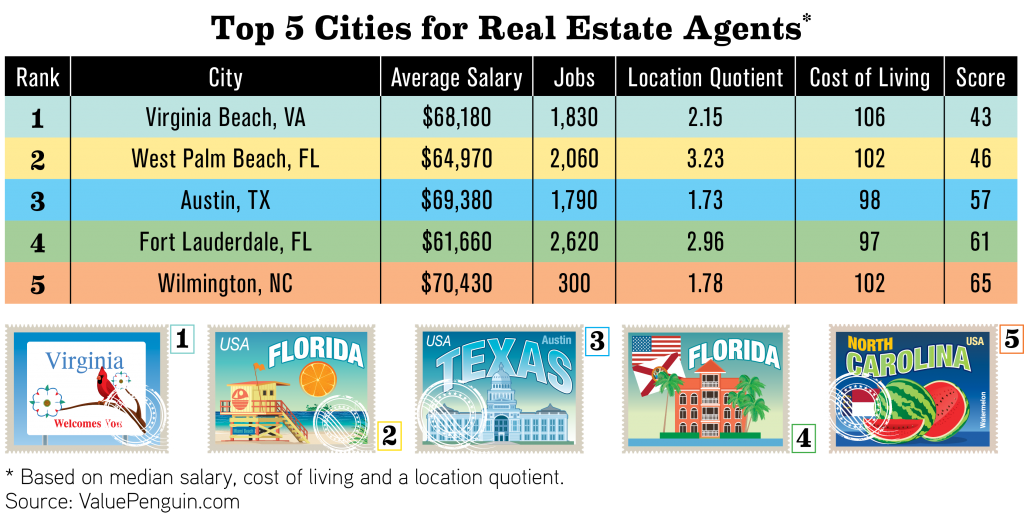Millions of Americans relocate every year for a variety of reasons—and agents can still perform even if they’re the ones moving
By Kathleen Hagan
Millions of Americans move every year—for new career opportunities, to take care of aging parents or new grandchildren, for monetary reasons or even just for a change of scenery.
 According to the Bureau of Labor and Statistics, 37% of the U.S. population can do their jobs remotely. And with more and more companies making remote work a permanent option for employees, moving has been all the rage lately. According to the National Association of REALTORS®, as of October 2020, 8.93 million people had relocated since the start of the coronavirus pandemic— an increase of nearly 94,000 compared to the same time period in 2019.
According to the Bureau of Labor and Statistics, 37% of the U.S. population can do their jobs remotely. And with more and more companies making remote work a permanent option for employees, moving has been all the rage lately. According to the National Association of REALTORS®, as of October 2020, 8.93 million people had relocated since the start of the coronavirus pandemic— an increase of nearly 94,000 compared to the same time period in 2019.
So what happens when a REALTOR® decides to jump on the bandwagon and relocate? “Don’t let somebody tell you that you should just refer,” says Alison Wisnom, CRS, associate broker with Coldwell Banker Realty in Annapolis, Maryland. “There are lots of options for transitioning out of a market.”
Partnering from a distance
Just because you physically leave a location doesn’t mean your business there has to end. It’s possible for REALTORS® to stay active and work in the same market even after they move away. But, oftentimes, it means changing roles and finding a trusted business partner who can be there in person.
Take Wisnom, for instance. After working in Hawaii for four years, she didn’t want to leave all of her hard work behind when she moved to Maryland in 2017 due to a change in location for her husband’s job. Instead, she took proactive steps to retain her business and continued to work with clients in Hawaii.
Considering Market Norms
When relocating to a new real estate market, Shannon Harrington, CRS, principal broker/owner at Blue Ridge Fine Properties in Staunton, Virginia, learned firsthand just how much market norms can vary. Before making a move, it’s smart to research and get up to speed on these aspects of a new market:
Pace. Is it a slow or fast-moving market? Is it urban or rural? Are preapproval letters expected?
Lead time for showings. When setting up a showing with potential buyers, is a day or two of notice preferred? Or is it OK to schedule something for the same afternoon?
Home inspections. Do potential buyers need to ask for repairs, or can they walk away?
Real estate contracts. Read through the standard contract used in the market and ask questions if you’re unsure about it.
“I really didn’t want to start all over again in Maryland,” Wisnom says. So she took stock of her business and figured out how she could work nearly 5,000 miles away from her team. “The first thing I did was switch to a national brokerage [Coldwell Banker] instead of a local one [Hawaii Life] so I could be with the same brokerage in both locations,” she shares. This change provided Wisnom with a larger support network and peace of mind.
Next, Wisnom looked at her team to examine what holes her physical absence would leave. “I determined I needed a business partner—an experienced equal I could trust and rely on—to be in front of clients,” she says. “My role needed to become more strategic, supportive and administrative. I keep things moving in the background and write up offers while my partner is out and about.”
After vetting and finding a trusted partner, Wisnom says letting everyone know you are a package deal is key. “Our marketing has both of us on all of the materials,” she says. “We always represent ourselves together—both of our email addresses are in each of our email signatures, we are both featured on property flyers, and we tell clients they can talk to both of us.”
Starting over
Not all CRSs who relocate decide to continue their existing business. Others choose to transition out of their old market completely and enter a new one. “The change can be jarring,” says Shannon Harrington, CRS, principal broker/owner at Blue Ridge Fine Properties in Staunton, Virginia, who previously worked in two other markets: Richmond and Charlottesville, Virginia. “Just know that it’s going to be weird and different for a minute, but then you’ll be fine.”
Because every market has its unique features, Harrington recommends keeping an open mind about market norms and being willing to adapt. “I’ve seen people move markets and think their way of doing things was better,” she says. “But to succeed in a new market, you need to adjust to their ways. Having a good mentor to guide you along can help ease the transition.” Additionally, it’s important to have a plan for handling referrals from your old market. At first, Harrington co-listed with another agent to ease the transition for sellers. For buyers, she simply referred.
Bringing in business
 When switching markets, one of the biggest— and most daunting—questions is: How do you generate new business? Besides traditional relationship-building methods like getting involved in the community and networking, a tactic that worked for Harrington was reaching out to for sale by owner (FSBO) sellers. “Chat with them and explain what you do and why you do it,” she advises. “A lot of times they are leaving money on the table and will hire you to represent them.”
When switching markets, one of the biggest— and most daunting—questions is: How do you generate new business? Besides traditional relationship-building methods like getting involved in the community and networking, a tactic that worked for Harrington was reaching out to for sale by owner (FSBO) sellers. “Chat with them and explain what you do and why you do it,” she advises. “A lot of times they are leaving money on the table and will hire you to represent them.”
For REALTORS® who are new to a market, Harrington also stresses the importance of featuring their listings on third-party sites like Zillow. “That’s where people go first when they’re looking at houses these days,” she says. “It gives you extra exposure, which is especially helpful when you’re new to a market.”
Getting prepared
Whatever changes relocating brings to your real estate business, it’s important to start preparing as far ahead of time as possible.
For Harrington, that means cultivating your online presence and making sure your website and profiles on third-party sites are up to date. “Reach out to past clients and get them to write a good public review before you move,” she suggests. “That way people can see you may be new [to this market], but you’re not new to real estate.”
Wisnom recommends building up content about your new location as far in advance as you can. “You can always blog and post about your new location before getting there,” she says. “You can even offer house-hunting tips and share your own journey—people can relate to that.”
Hindsight is 20/20
With her relocation experience in the rearview mirror, Alison Wisnom, CRS, associate broker with Coldwell Banker Realty in Annapolis, Maryland, says there are a couple of key lessons she learned in hindsight.
1. “Starting over” in a new location wasn’t as difficult as she originally feared. “Once I started selling in Maryland, I realized I wasn’t set back to zero—I still had all of my years of real estate experience,” Wisnom says. “So while I didn’t have the local business, I was much closer to generating it than I realized thanks to the skills and reputation I’d already built.”
2. Keeping her new physical location a secret initially may have resulted in missed referrals. At first, Wisnom was wary of letting other agents know she had moved away from Hawaii because she didn’t want them to start talking to and potentially poaching her clients. “But I think I misjudged that a little bit, because successful people don’t really have time to worry about what I’m doing,” she reflects. “Now that I’m selling in Maryland, I’m marketing to the agents I knew in Hawaii and they have been a great source of referrals.”
Visit crs.com/webinar to watch “You CAN Take It With You! How to Move Your Business” and earn 1 CE credit.
Photo: iStock.com/rudall30









